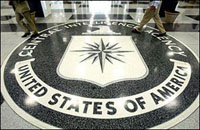The CIA used Nazi war criminals as government spies
Newly released documents suggest that the CIA used all possible ways to win the Cold War. It even kept quiet about the whereabouts of Nazi war criminals - and even tried to use some of them as government spies.

The CIA organized Cold War spy networks that included former Nazis and failed to act on a 1958 report that fugitive Nazi war criminal Adolf Eichmann was living in Argentina, newly released CIA records show.
The records were among 27,000 pages of documents made public yesterday at the National Archives. They shed new light on the secret protection and support given to former Nazi officials and Nazi collaborators by U.S. intelligence agencies as fighting communism became the central aim of American foreign policy in the years after World War II.
The subject of postwar collaboration between U.S. intelligence and former Nazis that the government sought to use in the struggle against the Soviet Union has been documented, but historians said the previously inaccessible documents have enabled them to fill in many blanks in the historical narrative.
About 60,000 pages of CIA records had already been released since 1999, after a 1998 federal law opened up secret government files relating to war crimes by the German and Japanese governments during World War II.
The materials released yesterday include operational documents detailing the activities of the CIA and its contacts abroad, historians and other officials said during a news conference at the National Archives.
Some of the newly released documents show that between 1949 and 1955, the CIA organized "stay-behind" networks of German agents to provide intelligence from behind enemy lines, should the Soviet Union invade western Germany.
One network included at least two former Nazi SS members -- Staff Sgt. Heinrich Hoffman and Lt. Col. Hans Rues -- and one was run by Lt. Col. Walter Kopp, a former German army officer referred to by the CIA as an "unreconstructed Nazi." The network was disbanded in 1953 amid political concerns that some members' neo-Nazi sympathies would be exposed in the West German press.
In a March 1958 memo to the CIA, the West German foreign intelligence services (BND) wrote that Eichmann, a top Gestapo official who helped orchestrate the mass murder of Jews, "is reported to have lived in Argentina under the alias CLEMENS since 1952." The memo also mentioned a rumor that Eichmann lived in Jerusalem.
In fact, Eichmann was in Argentina and was using the name Ricardo Klement -- but apparently neither the CIA nor the West Germans acted on the information, Naftali said.
Eventually, Israeli Mossad agents abducted Eichmann in Buenos Aires on May 11, 1960. He was tried in Jerusalem, sentenced to death and hanged on May 31, 1962, The Washington Post reports.
In another case, Ohio University historian Norman Goda discussed records showing how former Nazi SS intelligence officer Heinz Felfe, who was recruited by the Soviet KGB after the war, was able to join the West German intelligence service set up by the United States. He eventually rose to become chief of the division responsible for surveillance of the Soviets, the records show.
"He was no common mole," Goda said in a press briefing at the National Archives Building. Felfe was in charge of operations against the Soviets while "he took his orders from the Soviets."
Goda said Felfe caused "massive damage... as large an intelligence disaster as occurred during the Cold War", according to CNN.
Since Congress passed the Nazi War Crimes Disclosure Act in 1998, the Interagency Working Group has persuaded the government to declassify more than 8 million pages of documents. But the group ran into resistance starting in 2002 from the CIA, which sought to withhold operational files from the 1940's and 50's.
After Congress extended the working group's term to 2007, and after the intervention of Senator Mike DeWine, Republican of Ohio; Senator Dianne Feinstein, Democrat of California; and Representative Carolyn B. Maloney, Democrat of New York, Porter J. Goss, who was the CIA director, ordered the release of the records with very few deletions.
Stanley Moskowitz, a CIA official who assisted the working group for the last year, said the delicate question of releasing operational files has long been a "nettlesome problem" but that "the passage of time has shifted the balance" toward release. He said the new CIA director, Gen. Michael V. Hayden, has agreed to continue releasing the records, The New York Times reports.
Source: agencies
Prepared by Alexander Timoshik
Pravda.ru
Subscribe to Pravda.Ru Telegram channel, Facebook, RSS!




